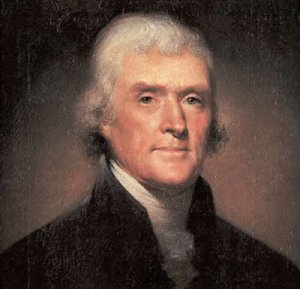On this day in history, Thomas Jefferson penned a letter to George Logan conveying his fears about the rise of aristocracy in the U.S.:
I hope we shall … crush in [its] birth the aristocracy of our monied corporations which dare already to challenge our government to a trial of strength and bid defiance to the laws of our country.”
[George Logan (September 9, 1753 – April 9, 1821) was an American physician, farmer, legislator and politician from Philadelphia County, Pennsylvania. In 1785 he was elected to the Pennsylvania legislature, serving for four years; he was elected for another term in the late 1790s. A Jeffersonian Republican, in 1793 he helped to found the Democratic-Republican Societies. In 1798, he went to Paris to negotiate peace with the French to settle the Quasi-War. On his return, he found he had been denounced by the anti-Jeffersonian Federalists, who had passed a statute informally known as the “Logan Act,” which made it a crime for an individual citizen to interfere in a dispute between the United States and a foreign country. In 1800, the year Jefferson was elected president, Logan was elected to the U.S. Senate for a six-year term.]
Jefferson’s antipathy to monied corporations was not new, but it usually was couched in attacks on Alexander Hamilton. Most recently, this quote was cited by Justice John Paul Stevens in concurring in part and dissenting in part in the Opinion of the Court for Citizens United v. Federal Election Comm’n (No. 08-205, decided January 21, 2010). Justice Stevens (who retired on June 29, 2010) employed entertaining sarcasm in noting:
The Framers thus took it as a given that corporations could be comprehensively regulated in the service of the public welfare. Unlike our colleagues, they had little trouble distinguishing corporations from human beings, and when they constitutionalized the right to free speech in the First Amendment, it was the free speech of individual Americans that they had in mind. While individuals might join together to exercise their speech rights, business corporations, at least, were plainly not seen as facilitating such associational or expressive ends.”
Filed under: History, legal, SCOTUS | Tagged: History, Jefferson, legal, SCOTUS |






Leave a comment